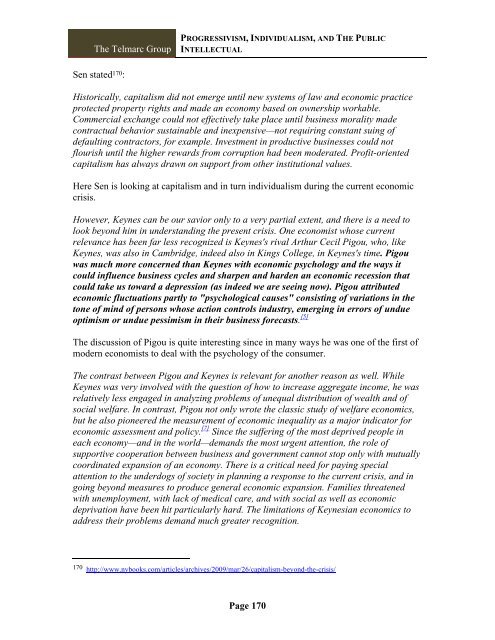progressivism, individualism, and the public ... - Telmarc Group
progressivism, individualism, and the public ... - Telmarc Group
progressivism, individualism, and the public ... - Telmarc Group
Create successful ePaper yourself
Turn your PDF publications into a flip-book with our unique Google optimized e-Paper software.
The <strong>Telmarc</strong> <strong>Group</strong><br />
Sen stated 170 :<br />
PROGRESSIVISM, INDIVIDUALISM, AND THE PUBLIC<br />
INTELLECTUAL<br />
Historically, capitalism did not emerge until new systems of law <strong>and</strong> economic practice<br />
protected property rights <strong>and</strong> made an economy based on ownership workable.<br />
Commercial exchange could not effectively take place until business morality made<br />
contractual behavior sustainable <strong>and</strong> inexpensive—not requiring constant suing of<br />
defaulting contractors, for example. Investment in productive businesses could not<br />
flourish until <strong>the</strong> higher rewards from corruption had been moderated. Profit-oriented<br />
capitalism has always drawn on support from o<strong>the</strong>r institutional values.<br />
Here Sen is looking at capitalism <strong>and</strong> in turn <strong>individualism</strong> during <strong>the</strong> current economic<br />
crisis.<br />
However, Keynes can be our savior only to a very partial extent, <strong>and</strong> <strong>the</strong>re is a need to<br />
look beyond him in underst<strong>and</strong>ing <strong>the</strong> present crisis. One economist whose current<br />
relevance has been far less recognized is Keynes's rival Arthur Cecil Pigou, who, like<br />
Keynes, was also in Cambridge, indeed also in Kings College, in Keynes's time. Pigou<br />
was much more concerned than Keynes with economic psychology <strong>and</strong> <strong>the</strong> ways it<br />
could influence business cycles <strong>and</strong> sharpen <strong>and</strong> harden an economic recession that<br />
could take us toward a depression (as indeed we are seeing now). Pigou attributed<br />
economic fluctuations partly to "psychological causes" consisting of variations in <strong>the</strong><br />
tone of mind of persons whose action controls industry, emerging in errors of undue<br />
optimism or undue pessimism in <strong>the</strong>ir business forecasts. [5]<br />
The discussion of Pigou is quite interesting since in many ways he was one of <strong>the</strong> first of<br />
modern economists to deal with <strong>the</strong> psychology of <strong>the</strong> consumer.<br />
The contrast between Pigou <strong>and</strong> Keynes is relevant for ano<strong>the</strong>r reason as well. While<br />
Keynes was very involved with <strong>the</strong> question of how to increase aggregate income, he was<br />
relatively less engaged in analyzing problems of unequal distribution of wealth <strong>and</strong> of<br />
social welfare. In contrast, Pigou not only wrote <strong>the</strong> classic study of welfare economics,<br />
but he also pioneered <strong>the</strong> measurement of economic inequality as a major indicator for<br />
economic assessment <strong>and</strong> policy. [7] Since <strong>the</strong> suffering of <strong>the</strong> most deprived people in<br />
each economy—<strong>and</strong> in <strong>the</strong> world—dem<strong>and</strong>s <strong>the</strong> most urgent attention, <strong>the</strong> role of<br />
supportive cooperation between business <strong>and</strong> government cannot stop only with mutually<br />
coordinated expansion of an economy. There is a critical need for paying special<br />
attention to <strong>the</strong> underdogs of society in planning a response to <strong>the</strong> current crisis, <strong>and</strong> in<br />
going beyond measures to produce general economic expansion. Families threatened<br />
with unemployment, with lack of medical care, <strong>and</strong> with social as well as economic<br />
deprivation have been hit particularly hard. The limitations of Keynesian economics to<br />
address <strong>the</strong>ir problems dem<strong>and</strong> much greater recognition.<br />
170 http://www.nybooks.com/articles/archives/2009/mar/26/capitalism-beyond-<strong>the</strong>-crisis/<br />
Page 170












